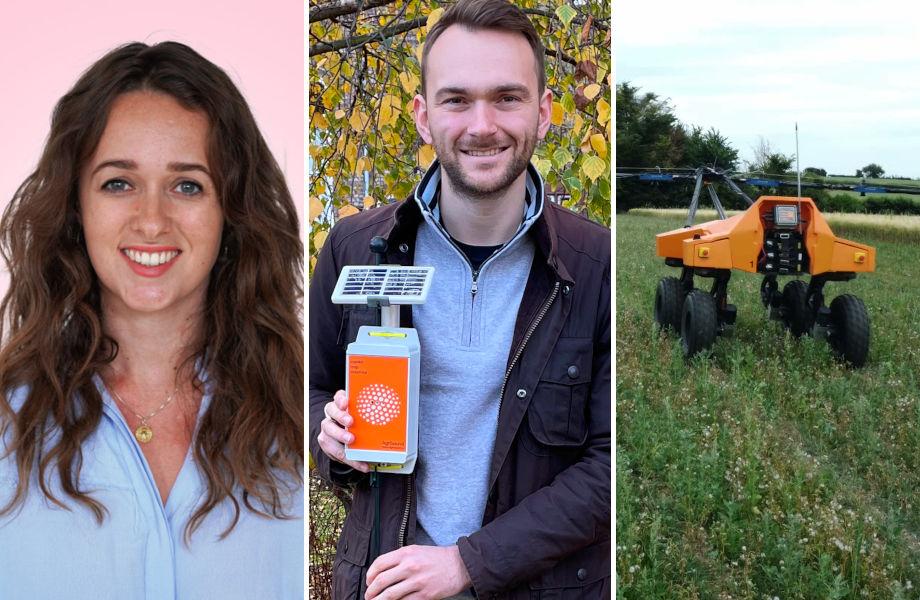There is still money out there, but less appetite for risk and greater demand for faster returns, says Sarra Mander, CMO of Small Robot Company (SRC), talking about the climate for agri-tech funding.
SRC, together with AgriSound, developers of bio-acoustic listening device for pollinators, and Crowdcube, an investment crowdfunding platform, are to discuss developments in crowdsourced funding at the Agri-TechE event ‘Focus on Funding’ on 23 May 2023.
SRC offers its fleet of small robots to farmers for ‘farming as a service’, and crowdfunding has played an important role in helping them gain traction in the market. Sarra continues: “Funding from the latest raise will enable us to commercialise to the point of profitability and then scale – we are looking at the US and Canada.”
Dr Belinda Clarke, Director of Agri-TechE, a membership organisation that supports innovation, comments that crowdfunding is not just for start-ups – companies are raising anywhere from £150k up to the European prospectus limit of 8m Euros. “We are seeing agri-tech companies at all stages in their growth taking this route,” she says.
Hollie Andrews is the Equity Fundraising Manager at Crowdcube where she advises B2B and B2C businesses on the benefits of being community-backed and ways to create a successful equity crowdfund. She comments that this change is because crowdfunding has evolved from attracting investors with rewards towards democratising equity funding.
She says: “Previously only those of high net worth could invest in a private business for equity; now everyday people can own a stake in businesses they love. From as little as £10 they can have skin in the game. We have seen this in microbreweries and craft beer through to the sustainability and cleantech movement.”
“If you are a new business building your initial community of power users, investors should be stickier, give better feedback, and be more likely to refer. For more established businesses, they see the benefit of converting their existing community into investors as a retention exercise. For any company that is looking to increase retention of their existing customers or clients, or acquire new customers, crowdsourcing is a great fit.”
Crowdcube helps the companies to manage their investors too, simplifying the process for early-stage companies.
It is easy to underestimate the time taken to raise funding and manage the process, according to Casey Woodward, CEO and co-founder of AgriSound. The company has developed Polly, a device that listens 24/7 to insects and uses advanced sound analysis to translate the data into activity scores.
Many crop plants are insect pollinated and the information enables food producers and landowners to target pollinator-protection measures. The company has partnerships with National Trust, WWF and Marks & Spencer.
Since Polly’s inception the company has raised £0.7M in private capital, including some from crowdfunding campaigns. Casey says: “Given our time again, we would have dedicated more time and resource to raising money rather than trying to do this in parallel with running the business. Raising money can be really difficult and time consuming; it’s a full-time role in itself. We would also try to be realistic with our levels of funding required and be confident to push back on unproductive partnerships.”
Sarra of SRC agrees it is a learning curve; the company’s first crowdfunding campaign was to secure match funding for an innovation grant from IET. “That was actually our hardest raise, as all we had at that point was an idea - we made the robots in the video from Lego! The initial government grant gave us the ability to set up the business, knowing that we had a good runway of secure funding to take our first proof of concept to a working prototype.”
SRC has to date raised a total of £11 million through six separate crowdfunding campaigns.
Both AgriSound and SRC have worked closely with end-users, and crowdfunding enables companies to ensure that technology is fit for purpose.
Sarra continues: “We then did a seed round with farmers, who joined us in the co-design process, enabling us to test the concept and ensure product market fit. This gave us credibility to raise equity crowd funding, which has now enabled us to commercialise.
“There’s no right order – it will depend on your business plan.”
The Agri-TechE event ‘Focus on Funding – Follow the Crowd’ is to be held virtually on Tuesday 23rd May 2023. Find out more by contacting info@agri-tech-e.co.uk
[Image shows Hollie Andrews (Crowdcube), Casey Woodward (AgriSound) and Tom (Small Robot Company)]


